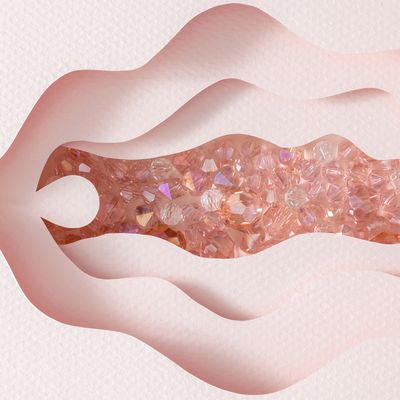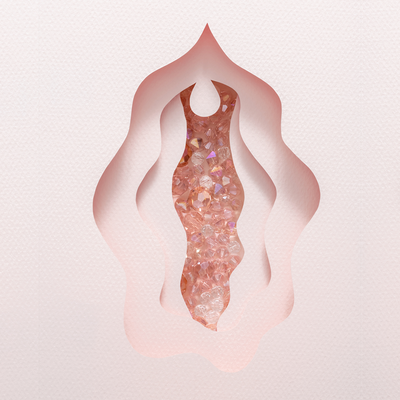

A Nutritional Therapist’s Guide To Managing PCOS
What Exactly Is PCOS?
“PCOS is one of the most common endocrine disorders that affects how the ovaries work. It’s thought to affect as many as one in ten women, but the statistics vary slightly, as there are several different criteria used to diagnose the syndrome. Despite the prevalence of PCOS, many women feel totally overwhelmed, isolated and misunderstood, and are left to figure out their diagnosis on their own. First, it’s vital to understand that PCOS is a syndrome, not a disease. As an endocrine (hormonal) disorder, you can expect to see an issue with hormonal production (typically testosterone, cortisol and insulin are overproduced, while oestrogen and serotonin are underproduced) as well as potential issues with the reception, transportation and detoxification of hormones, too.” – Hannah Alderson, nutritional therapist
What Are The Main Symptoms Of PCOS?
“Although there are common threads, every woman with PCOS will have their own version of the syndrome – so think of it as a spectrum. Not everyone will have all the symptoms and some symptoms may not be visible at all. Some of the main symptoms include ovarian ‘cysts’ (‘stuck’ follicles) absent or irregular periods, irregular ovulation, obesity, difficulty losing weight, difficulty getting pregnant, pregnancy complications and miscarriage, excessive hair growth, acne, skin tags, mood changes, anxiety, fatigue, brain fog, skin conditions like eczema, sleep disorders and IBS.”
Are Certain Symptoms More Common Than Others?
“PCOS comes in all manner of shapes and sizes, but the most common combination is irregular periods alongside excess weight around the middle, excess hair growth, acne and anxiety.”
How Do You Know If You Have PCOS?
“In the UK, we use a system called the Rotterdam Criteria. If you have two out of the three features below, it’s very likely you have PCOS:
- Anovulation: Infrequent ovulation which leads to irregular or absent periods.
- Hyperandrogenism: High levels of androgens (male sex hormones) determined either via a blood test or by observing symptoms like acne or excess hair growing in typically male areas, like the face, back and chest.
- Polycystic ovaries: This refers to an ovary that contains around twice as many fluid filled sacs or cysts than normal. These are in fact follicles and are not to be confused with ovarian cysts. Often described as a 'string of pearls,' these are follicles that have become stuck and are visible via an internal scan. In a healthy cycle, a few follicles start to develop, and one is chosen as the top recruit to fully develop and then be released as an egg. In PCOS no follicle ends up being picked for maturation, so they all end up sitting on the fence (or in this case, just below the surface of the ovary). This is why ovulation doesn’t occur, as no fully matured egg burst its way out of the sacs due to low levels of oestradiol.”
What Causes PCOS In The First Place?
“There’s no one cause, but research tells us it likely arises from genetic and environmental factors, with inflammation, elevated cortisol and insulin resistance all in the driving seat alongside an imbalance in the gut microbiome, an unstable circadian rhythm and exposure to endocrine disruptors. The pill has also been cited as a potential trigger due to its negative impact on our sex hormones and nutrient status. If we delve deeper, there’s also likely an issue with a process called aromatisation. This is where our oestrogen comes from, which is created from testosterone via an enzyme called aromatase. A little like the illuminated, dry-ice doors of Stars in Your Eyes, a transformation occurs and testosterone steps through the doors and becomes oestrogen – all thanks to aromatase. With PCOS this pathway is sluggish and doesn’t work very well. Via a loop system in the body, we then throw more testosterone into the mix with the aim to make oestrogen, as it notices it’s running low. The low levels of oestrogen then mean we don’t ovulate, but we keep on cueing the brain to make more testosterone. That’s when we get into a high testosterone pickle, causing PCOS symptoms to flourish. In the process, oestrogen receptors can become damaged which puts even more stress on the situation as you become less sensitive at noticing oestrogen is even there.”
Are There Different Types Of PCOS?
“Medically, you either have PCOS or you don’t, but there are most definitely different categories or camps you may fall into depending on your dominant driver. Insulin-resistant PCOS accounts for 70%-80% of all cases. When the body becomes less sensitive to insulin, we need more of it to get the same job done. When there is insulin resistance, several negative things happen in the body, one of which is raised testosterone. Signs of elevated insulin include sweet cravings, skin tags, brain fog and excess weight around the middle. There’s also PCOS driven by inflammation. The body treats chronic conditions like PCOS the same as an infection and sends immune cells to try and heal the situation – instead of solving the issue this causes chronic inflammation and these inflammation markers are correlated with elevated androgen levels (testosterone). Signs of inflammation driven PCOS include fatigue, joint pain, skin conditions like psoriasis and eczema, and IBS. Meanwhile, around 20% of women have adrenal-driven PCOS, driven by the adrenal glands, which are responsible for producing our stress hormones.”

PEXELS/COTTONBRO
How Best To Manage PCOS?
“Once you identify your drivers, you can get to work on creating a happier home for your hormones. This is typically done by improving insulin sensitivity, reducing inflammation and reducing stress (the triple threat of hormonal health). Managing PCOS requires a multifaceted approach, including gut support, circadian rhythm support (and therefore your sleep), movement, emotional wellbeing, a reduction in toxin exposure and a positive mindset.”
What About Supplements?
“There’s no one-size-fits-all approach, and food should always come first, but supplements can help fill the gaps. If you are looking to improve glucose regulation, try myo-inositol, which studies show can improve the regularity of the menstrual cycle and improve acne – I rate Pure Encapsulations Inositol Powder. For inflammation, a high-strength omega-3 like Bare Biology can help. Meanwhile, nutritional deficiencies, in particular vitamin D and zinc, can play a role in reproduction, inflammation and glucose balance, so consider topping those up alongside a good-quality multivitamin. To support ovulation and egg quality, the antioxidant NAC is great, and to support the gut, try a probiotic, which has been shown to improve mood and reduce testosterone.
Finally, What Are Some Of The Myths Surrounding PCOS?
1. Overweight Women With PCOS Are Lazy & Just Need To Eat Less
“Sadly, a lot of the PCOS community are made to feel like this, which can be very disheartening, triggering and cruel. Due to the metabolic picture and behaviour of PCOS, it can be extremely difficult to lose weight and extremely easy to put weight on.”
2. Losing Weight Will Solve PCOS
“Losing weight can help with symptoms but on its own it’s not going to get to the root cause. In fact, you can be a healthy weight and also very underweight with PCOS (Victoria Beckham, Daisy Ridley and Jools Oliver have all spoken about their struggles with PCOS but they might not look like the typical PCOS picture). If you’ve gone to your GP and been told to ‘just lose weight’, this advice isn’t in line with the latest research. In fact, a very low-calorie diet with no consideration to stress, sleep and exercise could make your symptoms worse.”
3. Women With PCOS Can’t Fall Pregnant
“Although it can be more tricky to fall pregnant, you can most definitely have a family with a PCOS diagnosis.”
4. Women With PCOS Can’t Eat Dairy & Gluten
“Beware of sweeping statements around food restrictions. Personalised nutrition is key and, although minimising or removing certain foods from a diet potentially could have a positive impact on an individual’s PCOS, it won’t for all. Don’t believe all the hype as it may do more harm than good.”
Where Can You Find Support?
“There are some incredible resources and experts out there who are passionate about making sure you get the support you need. Book an appointment with your GP, as a doctor is the only healthcare professional who can diagnose you. It can also help to enlist the support of a registered healthcare professional like a nutritional therapist. To avoid feeling overwhelmed, steer clear of social media accounts run by people without qualifications and stick to registered experts. Although it can be inspiring to follow someone’s PCOS journey, what works for them may not work for you.”
For more information or to book a consultation with Hannah, visit HannahAlderson.com. Hannah is also on the advisory board for PCOSAA.org and recommends turning to AE-Society.org and Verity-PCOS.org.uk for support.
DISCLAIMER: Features published by SheerLuxe are not intended to treat, diagnose, cure or prevent any disease. Always seek the advice of your GP or another qualified healthcare provider for any questions you have regarding a medical condition, and before undertaking any diet, exercise or other health-related programme.
DISCLAIMER: We endeavour to always credit the correct original source of every image we use. If you think a credit may be incorrect, please contact us at info@sheerluxe.com.